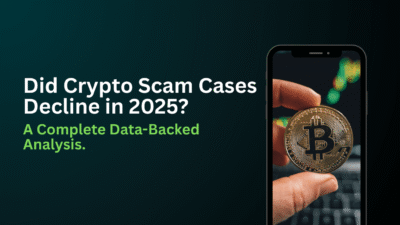
Christmas for Traders, Don’t Forget the Scammers!

Bitcoin’s meteoric rise above $40,000 has set the bulls dancing, wiping out shorts and leaving sellers stranded on the sidelines. The recent surge, fueled by macroeconomic shifts and the anticipation of the first US spot price ETF, paints a rosy picture for enthusiasts. But amidst the celebratory atmosphere, a lingering question looms: Is Bitcoin basking in too much glory an invitation to the scammers? As the excitement ripples through markets, and miners gear up for the halving, the scammers are eyeing on a post-$40,000 BTC world and waiting to fool the traders. While it’s Christmas for traders, it’s also crypto euphoria for the scammers. Let’s dive into details, and learn how to avoid getting scammed.
Early Christmas for Traders? Scammers are Excited Too!
Are you excited observing the green candles suffix to bitcoin? Guess, who else is excited? The scammers! Yes, they too are experiencing the crypto euphoria.
Over the years, there have been several headlines on scammers raiding the crypto space. According to the US Federal Trade Commission, between 2021 and 2022, over 46000 people reported losing $ 1 billion to crypto scams. Chainanalysis’s 2023 crypto crime report shows the total value of crypto scams rose to $20.6 billion. These were received from illicit addresses.

TERRA-LUNA CRASH
Do Kwon, a cryptocurrency entrepreneur linked to TerraUSD and Luna’s crash, faced arrest and fraud charges by US prosecutors. He co-founded Terraform Labs, connected to the multibillion-dollar collapse of these cryptocurrencies. Kwon’s indictment, published in a Manhattan court, includes eight counts. He got arrested in Montenegro and South Korea seeks his extradition due to criminal charges.
Allegations against Kwon involve fraud and tax evasion after investor complaints last May, accusing him of running a Ponzi scheme. He’s accused of misleading investors and violating capital market laws. Interpol issued a red notice for him, invalidating his passport. Another Terraform Labs co-founder, Daniel Shin, is also under investigation for allegedly making illegal profits before the coins’ collapse. TerraUSD, meant to be stable against the US dollar, crashed, causing holders of TerraUSD and Luna to lose over $40 billion in market value in late May.
Remember the Case of Celsius Bankruptcy? The Beginning of Crypto Winter
Alex Mashinsky, the ex-CEO of Celsius Network, faced criminal and civil charges related to fraud. Celsius, a crypto lending platform, grew big with 1.7 million users and $25 billion in assets. Problems arose with leveraged trading practices and market downturns, hitting hard in early 2022.
The CEL token dropped due to market instability and the fall of Terra. Celsius halted withdrawals in June 2022 to manage its obligations, eventually filing for Chapter 11 bankruptcy in July 2022, leaving users worried about their funds.
Before resigning as CEO in September 2022, Mashinsky faced distractions amid the platform’s financial troubles. Reports indicated Celsius had about $2.8 billion in debt. By 2022 end, an indictment against Mashinsky and Celsius emerged, with accusations of fraud.
FTX Collapse That Shook The Industry to Its Core
FTX collapsed in November 2022 within 10 days following a report by CoinDesk. It disclosed that Alameda Research, closely linked to FTX and run by Bankman-Fried, held mostly FTT tokens and other insider-controlled tokens, instead of established cryptocurrencies or fiat currency.
This revelation sparked panic among investors. Thereafter, causing a mass withdrawal of funds and resulting in FTX’s insolvency and subsequent bankruptcy declaration. Concerns arose about FTX’s heavy reliance on Alameda Research, raising worries about its financial stability due to possible excessive leveraging and uncertain financial practices.
Binance CEO Pleads Guilty to Money Laundering Violations
Changpeng Zhao, the founder of Binance, was forced to resign as CEO after pleading guilty to violating US anti-money laundering laws. The US government charged Binance with a $4.3 billion settlement, the largest in US history. Zhao was also charged with a personal settlement of $50 million. Binance failed to report over 100,000 suspicions involving terrorist organizations, such as ISIS, Hamas, and Al Qaeda.
Related: Bitcoin Soars, Crypto Market Divides
Tips to Stay Secure & Away From Scammers
With the bitcoin bull run, Christmas has arrived early for both the traders and the scammers. Here are some tips to stay safe, and secure from scammers in the party season.
Not Your Keys, Not Your Coins!
“Not your keys, not your coins” means that investors cannot be certain of their crypto holdings unless they have the keys to their wallets. Custodial solutions, such as exchanges or investment managers, mean the middleman is in control of the keys to your holdings. If the worst happens, such as the collapse of an exchange or a cyber-attack, those holdings could be lost altogether.
Do Not Reply to That Hot Chick Who Messaged You
Scammers fooling people looking for love is nothing new. However, as it’s early Christmas for traders, many scammers have shifted from simply buying gifts to buying cryptocurrencies. Dating is one of the best and most popular ways to scam people, especially in the bull market. It involves trust building, forcing people to buy crypto, and making false promises of high returns.
According to a 2022 report by FTC, $139 million worth of crypto was conned by romance scammers. Moreover, these crypto romance scammers not only target dating apps like Bumble or Tinder, but they also text you on Instagram or Facebook. Therefore, next time a hot chick texts you, do not reply. Anyway, they are already out of your league.
HODLING is Your Best Strategy
HODL (Hold On to your Dear Life) is a popular strategy among crypto enthusiasts, encouraging a long-term approach to cryptocurrency investing. HODLers believe that cryptocurrencies will eventually replace government-issued fiat currencies, making exchange rates irrelevant. A meme captures this philosophy, with Neo from The Matrix asking if he can trade Bitcoin for millions, to which Morpheus responds, “No when you’re ready, you won’t have to.”
Do not Chase After Another SHITCOIN
Shitcoins are often low in price. This is because it fails to meet the investor’s expectations. Moreover, the creators are not able to deliver their promises. Therefore, it’s best to avoid shitcoins, as it might turn out to be a scam. Often people invest in shitcoins and lose all their money.
DO NOT Share Your Seed Phrase
A seed phrase is the combination of alphanumeric that is the password to your crypto wallet. The increase in several scammers has compelled traders to secure their crypto wallets. Therefore, always choose a safe and secure wallet, and NEVER share your seed phrase with anyone.
Be Aware, Be Cautious, Be Vigilant!
With the crypto winter chapter finally coming to an end, the industry is preparing for the next bull run. Often people get too excited and jump into trading. While it may be a Christmas for traders, don’t forget the scammers. Be aware, be cautious, and be vigilant.





Leave A Comment